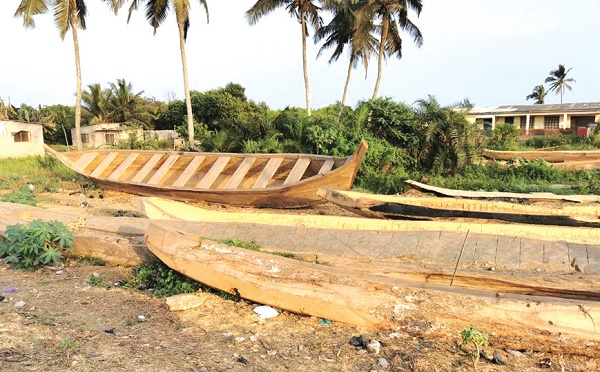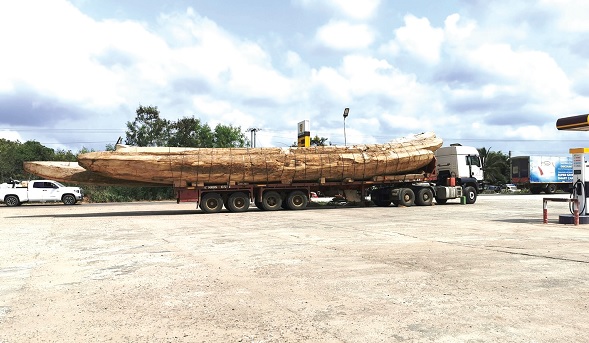
3-Year temporary ban on new canoe entrants
One of the major contributing factors to the drastic decline in Ghana’s small pelagic stock is overcapacity (too many vessels) in the sector which has resulted in overfishing.
Advertisement
The current race to catch the last fish is a direct result of Ghana’s open access in the artisanal sector that puts no restrictions on new entrants.
There is an absence of sufficient regulatory and enforcement measures to restrict canoe fleet catch and effort to sustainable levels.
Not only have the number of canoes increased, but also their efficiency.
Over the past decades, the sizes of the canoes have increased and fishing nets have become larger and longer, with high-powered outboard motors, which enables fishers to go further per trip, coupled with subsidies on fishing inputs (fuel, nets, outboard motors, etc).
Overfishing with a corresponding reduction of stocks has driven fishermen to spend more hours/days at sea as they struggle to make fishing profitable, even with government-supported fuel subsidies.
The report by the Scientific Technical Working Group (STWG) on the status of the small pelagic stocks in Ghana reveals that stocks are likely to collapse completely in the near future,unless there is a significant and rapid reduction in fishing pressure.
This demonstrates the urgent need for stringent interventions to halt and reverse this trend.
Thus, the Ministry of Fisheries and Aquaculture Development and the Fisheries Commission (FC) has placed a three-year temporary ban (moratorium) on all New Canoe Entrants in the Marine Sector from October 1, 2023 to September 30, 2026.

Newly carved canoe being conveyed to the seaside
So, for the next three years, new canoes are not expected to be built and brought into the system.
Additionally, to ensure the smooth implementation of the moratorium, all existing and newly built canoes are to be registered and embossed with numbers in compliance before the implementation period.
Rationale
Per statistics, the marine canoe sector, which harvests particularly small pelagics, plays a significant role in the national economy.
Despite their substantial contribution to the national economy, marine small pelagic resources are considered severely overfished (FAO/CECAF; 2015 STWG, 2016; & STWG, 2017).
The small pelagic fishery consists mainly of round sardinella (Sardinella aurita), flat sardinella (Sardinella maderensis), anchovies (Engraulis encrasicolus) and mackerel (Scomber colias).
These species make up between 70 to 80 per cent of total marine fish landings in Ghana and are of major importance to the canoe (artisanal) fleet that lands more than 70 per cent of the total small pelagic fish catch.
The canoe sector is the major provider of employment in the marine fisheries sector. In the past, small pelagic fisheries contributed significantly to employment, food security, and poverty reduction in the country.
It is estimated that about 10 per cent of the total population of Ghanaians depend directly or indirectly on fish for their livelihoods, making about 3.3 million of the population.
Fish is the preferred source of animal protein in Ghana.It is estimated that 75 per cent of the total domestic production of fish is consumed locally, representing 60 per cent of total animal protein intake nationally.
Currently,the small pelagic fisheries, particularly the sardines, anchovies and mackerels are on the verge of collapse.
Annual landings have declined for more than a decade as fishing efforts have increased.
A complete collapse of this fishery would adversely affect food & nutrition security, employment/livelihood, the economy, and community/social interactions across Ghana.
Purpose
The overall purpose of the moratorium is to regulate the increasing canoe fleet and control fishing effort to aid in the sustainable management and rebuilding small pelagic stocks with the objective to improve the health of Ghana’s fisheries by aligning fishing effort with estimated annual sustainable levels and to manage the country’s artisanal fishery alongside existing measures among others.
Effective implementation of management actions requires close collaboration and active participation of fishers and other relevant stakeholders along the value chain to ensure inclusivity and build ownership to sustain the action.
Supported by the US Agency for International Development (USAID), the Ghana Fisheries Recovery Activity (GFRA), the ministry and the FC, vetted the measure across all relevant stakeholders through a series of engagements organised at national, regional and community levels.
A national dialogue was held on February 16, 2023, with Coastal Regional ministers, the Forestry Commission, the Parliamentary Select Committee on Food, Agriculture and Cocoa
Affairs (PSCFACA) and Metropolitan, Municipal and District Chief Executives (DCEs) from all the 30 coastal districts.
Four regional multi-stakeholder engagements were also held between March 1 – 9, 2023, with fishers, district assemblies, traditional authorities, academia and other stakeholders who are affected by the management measure.
Members of the canoe carver’s association, who are responsible for the carving of canoes from the wawa tree, also participated in the regional dialogues.
More than 1,200 fishers were engaged through 15 cluster community engagements across the four coastal regions in 2022.
Conclusion
The temporal ban (moratorium) on new entrants is in fulfilment of one of the objectives of the approved and gazetted 2022 – 2026 Marine Fisheries Management Plan, which set out specific targets to manage the artisanal (canoe) fishing fleet through effort control measures.
The moratorium is one of the key steps to manage Ghana’s fisheries to sustainable levels and prevent the collapse of the sector.
It is envisaged that over time, canoe numbers would drop as fishers grow old and retire from fishing.
Replacement of existing canoes will only be based on conditions set by the FC, but new capital investments (construction of new boats) will not be allowed during the period of the moratorium.
The writer is the PRO,
MoFAD.




